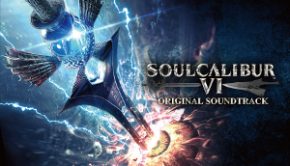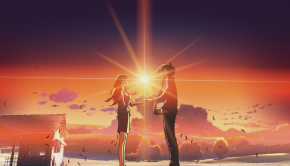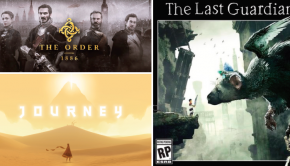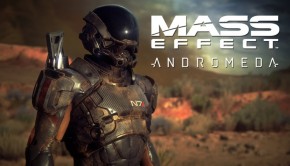Andrew Pogson Interview: A New Game Music Concert for Australia
On April 12 2012, the Melbourne Symphony Orchestra, Australia’s oldest symphony orchestra, will perform Video Games Unplugged: Symphony of Legends at the Melbourne Exhibition & Convention Centre under the baton of Eminence’s Philip Chu and featuring the Concordis Chamber Choir. This is an original concert presentation that has been developed outside of the existing video game music tours and concert series.
With live performance premieres of music from The Elder Scrolls V: Skyrim, Uncharted 3 andSoulCalibur V, new arrangements of pieces from Bioshock 2, Secret of Mana, World of Warcraft, Starcraft II and Diablo III, a guest performance by Jillian Aversa, and Wil Wheaton co-hosting the event, this concert promises to be a major new entrant into the world of live game music performances.
In this interview, Andrew Pogson — manager, artistic administration of the Melbourne Symphony Orchestra — reflects on the orchestra’s artistic background and how it contributed to the creation ofVideo Games Unplugged. He describes his artistic ambitions for the event, the process of selecting the compositions to be performed, the MSO’s collaboration with Eminence in producing the concert — and exactly how that on-stage SoulCalibur V live tournament is going to unravel.
Interview Credits
Interview Subject: Andrew Pogson
Interviewer: Simon Elchlepp
Editor: Simon Elchlepp
Coordination: Simon Elchlepp
Interview Content
Simon: Andrew Pogson, thank you for taking the time today to talk about Video Games Unplugged: Symphony of Legends. Firstly, since some of our readers might not have heard about the Melbourne Symphony Orchestra before, could you please introduce the orchestra and its activities?
Andrew Pogson: The Melbourne Symphony Orchestra is Australia’s oldest orchestra and has been a part of the Melbourne arts scene for a long time. We feature a wide variety of concerts almost every week of the year from “the classics” (Mozart, Beethoven etc.), a ground breaking new music festival called “Metropolis”, our Education Weeks, to our “Pops” and “Special” series. We also get involved in really unique pop-up orchestra performances, late at night and in hidden venues in the city, called “Secret Symphony”. There really is something for everyone.

Simon: This is the first time that the Melbourne Symphony Orchestra performs game music. How did the decision to perform such repertoire come about? Since the MSO has performed music outside of the classical repertoire (film scores, ABBA, Doctor Who etc.) for years, do you feel that performing game music is a natural extension of the MSO’s musical activities?
Andrew Pogson: Absolutely! I personally see a game music concert as no different than a movie or TV theme night or any other non-classical concert. So in that respect, this is a natural extension for the orchestra as we have been presenting those sorts of concerts for many, many years. Video game music, in many ways, is the soundtrack of so many people’s childhood; it certainly was (and is) for me. I guess the decision for the MSO to venture into this repertoire was due to the fact that the MSO has a desire to reach as many people as possible with world-class orchestral music. It is a simple goal that isn’t always tied to genres. It also doesn’t hurt that I have been a gamer and a musician all my life!
Simon: Now that Western orchestras such as the WDR Radio Orchestra Cologne and the Royal Stockholm Philharmonic Orchestra have performed game music, it has become more common to see game music on the schedules of ‘traditional’ symphony orchestras (as opposed to dedicated game music ensembles). Do you feel that these orchestras have blazed a trail for others to follow? In how far did the popularisation of game music that these orchestras have achieved impact the MSO’s decision to perform game music?
Andrew Pogson: Although I’m very familiar with the success of some of the other “traditional” orchestras around the world, it really wasn’t a factor in making the decision to go ahead with this concept. The MSO has a bit of a tradition of its own with surprising collaborations like Sting, KISS, Elton John, Tim Minchin and Doctor Who for instance. The days of only playing classical repertoire each night are long gone and any orchestra who still thinks in this way is in a lot of trouble, I believe. I really never feel pressure to conform to what the public believe we should be. In fact it’s often fun breaking those rules and bringing new audiences into the theatre as a result.
Of course I really respect the courage of those first orchestras around the world who took that leap. I think that was also during a time when video game music was still thought of as a bunch of “beeps and bops” from a computer speaker by the general public and it would have been tough to forge ahead regardless.
Simon: Could you describe to us who your intended audience for Video Games Unplugged is? How much of a challenge is it to balance the concert program so that the music appeals to both hardcore and casual gamers, and in how far is this a concert that non-gamers can enjoy as well?
Andrew Pogson: That’s a really great question and one I have agonised over for many months. Firstly, I’ve tried to design a show that is for all ages. That doesn’t mean that we will be playing specific things for kids and then stuff for adults. What it means is that the mood of the concert moves between really light-hearted and fun to a more serious tone, while featuring some really haunting and beautiful music. In many ways, this sort of style is pretty timeless and you won’t have to be old (or young) to get it.
The real challenge was choosing music that would hopefully appeal to the “hardcore” fans as well as people who are just into casual gaming, pop culture or just pure music. This is why I have chosen things that are as yet unreleased (for the hardcore fans) and other games that were perhaps less financially successful that featured amazing scores. However that said, it always starts with the music. If the music is weak, we simply didn’t include it in the concert, even if the franchise was huge.

Simon: Video Games Unplugged is produced in conjunction with Eminence. How did the collaboration with Eminence come about and what did their extensive experience in organising game music concerts bring to the table? What did the collaborative process look like in detail and in how far were Eminence involved in creating the orchestral arrangements for Video Games Unplugged?
Andrew Pogson: I have known about Eminence for many years. It is impressive what they have achieved as an organisation that started from nothing with little to no public funding. That must have taken some serious dedication, and their results speak for themselves.
The real expertise Eminence brought to the table was in the arrangements of the game scores. The MSO have piles of world-class arrangers that we work with, but none that had any experience in gaming music. What we needed was a like-minded organisation that was as concerned about the artistic quality of the music as I was. Eminence is an easy choice in that respect. That is really where the relationship began; from the music. I have spent hours and hours discussing set list choices and arrangements with Eminence and it has really helped speaking to people who understand not only the orchestral world, but also the audience we are trying to reach.
Simon: The concert is billed as “a world-first presentation”. When and why was the decision made to not base this event on already existing game music concerts and tours?
Andrew Pogson: I had been “shopping around” for game music concerts for quite some time. I would watch footage or read set lists and think “wouldn’t it be great if we also did this game and that game….” In the end I made the choice to just put it together myself.
With the advent of sites like YouTube, you can pretty much see all of these concerts around the world from the comfort of your home. I didn’t want people paying their money to see the MSO and thinking “right, well I saw that in 2007, that in 2009 and that has been on tour for ages”. I really wanted people to come along to a brand new concert and know that they are the first people ever to experience this. That is something you can’t get online and something that is important for any live performance company to aspire to.
Simon: Indeed, the number of live game music concerts has increased substantially in the past five years. How do you feel that Video Games Unplugged will differ from previous game music concerts? Or do you maybe feel that — similar to let’s say performances of classical music — there isn’t necessarily a need to ‘differ’ and that the aim is first and foremost to produce a first-rate concert?
Andrew Pogson: I agree in general with your statement about these sorts of concerts not needing to “differ” too much, as the genre and concept is strong enough not to warrant a once-off mentality. For instance, I’m not embarrassed when we perform Beethoven again, as I know that we have spent serious time working out how we will bring something new to the table. This is exactly the same here. We have spent a huge amount of time trying to work out what the MSO is bringing to the table. The way we have hopefully achieved this is in the presentation style and the quality of the arrangements.
One of the truly unique aspects however is that we will be holding a professional, live video game tournament on stage. The contestants, who have made it through preliminary finals weekends at other tournaments, will be on stage playing SoulCalibur V. Where it gets really special is that the MSO will be playing the fighting music live. This is no easy feat as we don’t know how long the tournament will last and therefore how much music we need. It was at that stage we decided to acquire the actual fighting music, and like in the game, adapt the arrangement on the fly depending on what the fighters are doing. It sounds great but is going to be a lot of pressure on our conductor to pull it off!

Simon: Previous game music concerts have tended to fall somewhere between the more serious, ‘classical’ approach of Germany’s Symphonic Game Music Concerts and the rock ‘n’ roll presentation ofVideo Games Live, with interactive audience segments and elaborate light and video show. On which end of the spectrum does Video Games Unplugged fall, and what’s the motivation behind this stylistic orientation?
Andrew Pogson: I think, if I was forced to choose a side, I would say that this show will tend more towards the Symphonic Game Music Concerts you mentioned. However, I have included many of the elements that you would find in a show like Video Games Live (or indeed any other music concert with screens and lighting).
I’m personally not a huge fan of video game music shows that really dumb down the music or assault you with lasers and so much smoke you don’t know what’s going on. That sort of stuff is fun in a way, but I really want the music to be the champion here. Every element needs to be in place to heighten the emotion of the score and extend the aural experience with a visual one that works together, not against. I guess I’m looking for some of the fun you would get from one of the sides mixed with some of the superb arrangements you get with the other side. Perhaps we are in the middle?
Simon: With almost forty years of video games to work with, choosing which music to play at an event like Video Games Plugged becomes more difficult with each passing year. How did the selection process take place and in how far was the repertoire of previous game music concerts by other companies a deciding factor? Do you feel like there are particular pieces of game music that just have to be played because they have become classics and audiences expect to hear them? (Final Fantasy VII‘s “One-Winged Angel” comes to mind…)
Andrew Pogson: You’ve hit the nail on the head here. My desire to present “new” everything has had to be balanced with the inclusion of true classics that would be a shame not to perform. Though, once again these were added on the strength of the music, not what I thought fans wanted (because if we all knew that, we would all be rich!).
It’s really hard though — so many people engage with video games in so many different ways that it is hard to include every piece that every person wants to hear. I liken it to trying to perform the first ever movie theme concert (if that was to happen today). What would you include? Would you go back to the golden years of Hollywood, would you concentrate on recent blockbusters or would you include movies that no one has heard of, knowing that the music is still stunning regardless? The more these concerts are performed the easier it gets in my opinion as you can slowly tick off all the amazing soundtracks out there that you didn’t get to do last time.

Simon: Video Games Unplugged will reportedly feature the live performance premiere of music fromThe Elder Scrolls V: Skyrim, Uncharted 3, and SoulCalibur V. Will the performance of these pieces be based on the original arrangements heard on their album releases, or have these arrangements been tweaked for the live event? Can you reveal which pieces are based on arrangements exclusive to Video Games Unplugged, and how the decision was made to create new arrangements for exactly these compositions?
Andrew Pogson: I guess the pieces you mentioned will follow the original arrangements more closely than some of the others. This is for a simple reason; for a new arrangement (not the original) to make sense, the audience have to be really familiar with the original composition to appreciate what you have done to change it. If you are performing world firsts, it is important to set the benchmark for where other performances can move from.
It’s a privilege to be performing these first, as I’m sure many other shows would love to be making these claims. That said, we have been working with the original composers, arrangers and Eminence to create scores that take advantage of the kinds of orchestral forces that the MSO have on hand. In many cases, these arrangements have been ramped up to really try and blow the audience away.
In terms of new arrangements we will hear new takes on Bioshock 2, Secret of Mana, World of Warcraft, Starcraft II, and Diablo III along with another unreleased game I can’t talk about yet (!)
Simon: One of the most anticipated items on the event’s program is the music from the as of yet unreleased Diablo III. Could you elaborate how the inclusion of music from this particular game came about, and did it prove a challenge to secure it for Video Games Unplugged?
Andrew Pogson: I can’t wait for this game! I spent far too many hours at University playing Diablo IIinstead of studying. So from my point of view it was unbelievably exciting to gain access to this from Blizzard. I guess this became possible after talking to them about World of Warcraft and Starcraft, and casually enquiring on whether Diablo III would be on the cards. Luckily for us they said yes and we will be performing the Eminence arrangement that has never been performed live.
Simon: With the event to be hosted by Scott Kurtz and Kris Straub of Penny Arcade TV’s Blamimations, and actor Wil Wheaton as a special guest, Video Games Unplugged has an unusually high-profile roster of presenters. How did the involvement of these three pop culture experts come about and what do you feel they will add to the event?
Andrew Pogson: I tried to put together the sort of show I would love to attend as a fan and then hope that others felt the same. Simple as that. I adore the chemistry that Kris and Scott have together as a comedy duo of sorts, and I love that Wil Wheaton is able to really speak to the hearts of gamers (and geeks in general) with his honest and humble story telling. That is really the show in a nutshell; a bunch of fun with some heartfelt performances. In my mind this is the dream team to pull this off.

Simon: Finally, is there a chance that we might see the MSO perform again at an event like Video Games Unplugged? What are the chances that in the future, the MSO might incorporate game music in concerts that are not solely dedicated to this genre? Thank you for your time today.
Andrew Pogson: Of course there is a chance! Video game music is here to stay and will only get more popular and more “mainstream” as the generations who grew up with gaming become the parents and the decision makers. However, I’m uncertain we would include gaming scores in a non-gaming concert anytime soon, but that is purely because I really like to have our concerts really strongly themed. I think if you choose music from all sorts of areas in a kind of pop-culture-extravaganza, you lose focus and make many of the challenges in choosing repertoire (that we faced with Video Games Unplugged) even worse and therefore everyone harder to please. Though I have learnt to “never say never”…
Tickets for Video Games Unplugged: Symphony of Legends can be purchased here before the premiere on April 12.
Posted on April 15, 2012 by Simon Elchlepp. Last modified on March 2, 2014.














